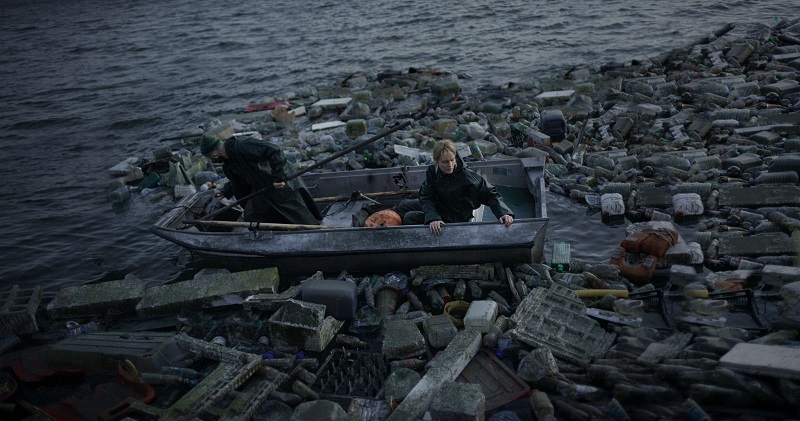Last Sentinel (Toom, 2023)
Those in a generous mood will probably call Last Sentinel a genre mashup, but I’m not altogether sure the film itself knows what it is going for. Part Waterworld, part Children of Men, part Waiting for Godot, the film has, I suppose a distant kinship with Stalker. It’s a melancholy, meditative work more interested in its situation’s ability to extract philosophical dialogue from its characters than its ability to force them into dramatically meaningful decisions.
In an opening voiceover, Cassidy (Kate Bosworth in the Cassandra role) tells us there is, figuratively and literally, no “uplift” in her world. She is part of a small team of paramilitaryishesque soldier-scientists occupying a shed on stilts in the middle of the ocean. They collect data for people who may or may not still be alive as part of a civilization that may be, probably is, already dead. (This is, after all, the “last” sentinel.) Add On The Beach as another point of comparison.
They are inheritors of a vague apocalypse. One side “fucked the climate” and the other side “fucked the seas” before both sides “fucked each other,” says one character in the sort of expository dialogue that makes you wonder why he would think the person he is speaking to didn’t know why they are where they are doing what they are doing. The “only way to help the world,” he continues “is to wipe out the humans.” The only difference between the team and their never shown enemies is that “they’re trying to kill us and we’re trying to kill them.” Clearly, this is a team we can all admire and root for.
Okay, so those are cynical takes, but cynical characters and even cynical movies can nevertheless make real points, particularly if those characters are antagonists or foils for principled characters we can identify with or hold out hope for. The problem with Last Sentinel isn’t that there are cynical characters or even that the movie appears to side with them. The problem is these emotions — pessimism, cynicism, despair — are not particularly dramatic nor interesting without something to push back against them.
Cassidy is presumably meant to be the heart and soul of the movie, but Bosworth struggles to find anything in the material she is given to make this character distinct from any of the others. Sex with one of her coworkers is implied, but she tells him flat-out that she doesn’t love him, presuming that’s what he is trying to get her to say. The absence of any character backstory at all makes the stakes hard to fathom. If there is nobody waiting for them on the other side of the ocean and no world to save, what does it matter if they do their job or not? Perhaps there could be a Darwinian theme here — that the will to live is animal rather than human, and that the survival instinct overpowers us even when reason says we have nothing to live for. But for that to emerge as a real theme, someone would have to decide to do something in response to the perceived pointlessness of everything other than merely lament it.
Decades ago, when I was an undergraduate, I wrote a paper about how novels, movies, and pop culture, processed anxieties around the atomic bomb. While watching Last Sentinel, I thought that perhaps there is a student somewhere doing the same for climate change right now. So while I don’t see the film making its way into any canon-making lists, I could see it referenced in a dissertation or two some day.

